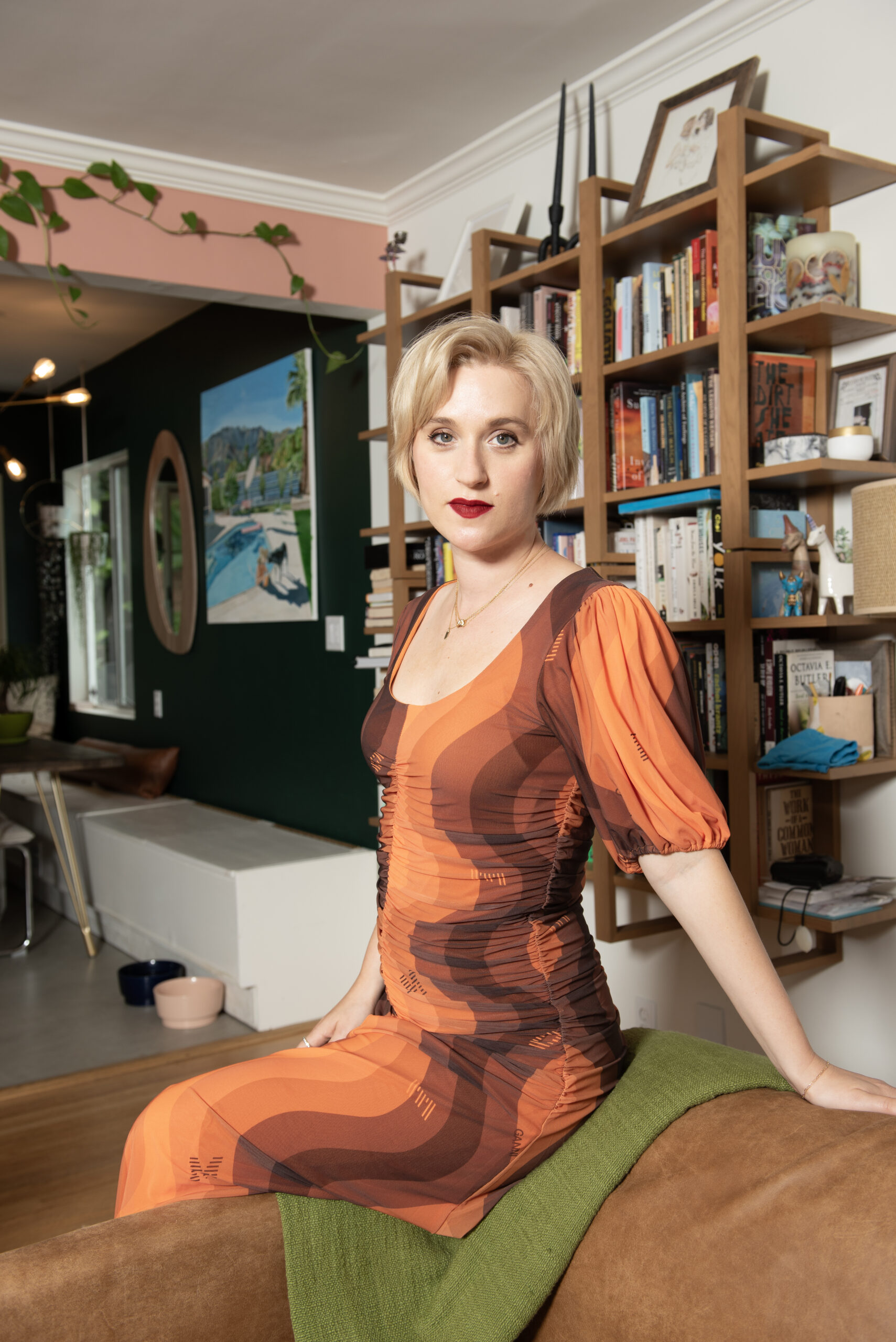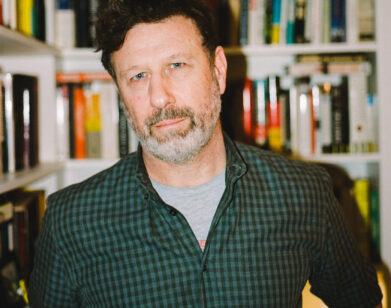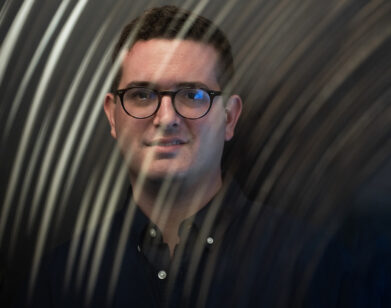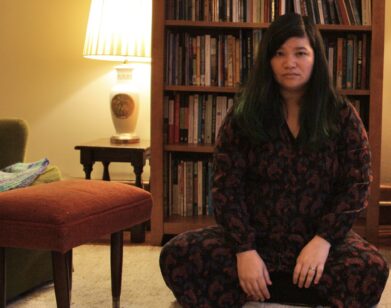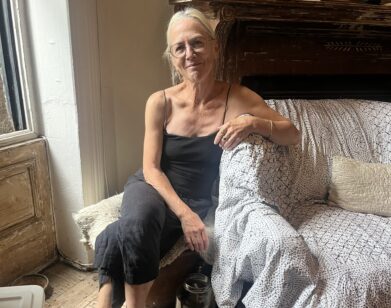LIT
Gabrielle Korn on GoodReads Trolls and Girlboss Dystopias
Gabrielle Korn has built her career in women’s digital media, serving as beauty editor and director of fashion and culture for Refinery29 and becoming the youngest and first out lesbian editor-in-chief of Nylon Media. But, throughout her decade in the field, what Korn really wanted was to write science fiction, even as reality was starting to closely resemble some sort of careerist dystopia. Nightmare experiences with digital media girlbosses, plus the Trump presidency, the threat of climate change, and the pandemic, provided an eerie canvas on which she painted the dystopian world of Yours For The Taking, a complex climate story examining the contradictions of second-wave feminism, specifically in its view of power and queerness.
The novel, which follows Korn’s 2020 essay collection Everybody (Else) Is Perfect, invites readers into a world where wildfires have destroyed Los Angeles and Manhattan is plagued by hailstorms hauling garbage against windows. Globally, 700 million people have been displaced by rising sea levels. By dreaming up The Inside Project—exclusive, enclosed, city-sized structures in Singapore, Nairobi, Auckland, Moscow, São Paulo, and New York City—Korn asked herself, “What would it look like if it’s not just a choice to stay inside, but a government mandate, and also a privilege? What if not everybody gets to stay inside?” Billionaire girlboss Jacqueline Millender runs the Manhattan branch of Inside, which she single-handedly decides to make a matriarchy. Writing Jacqueline allowed Korn to explore what she called one of the “greatest disappointments” of her professional life, “this feeling of being heartbroken that women, when given power, can be as evil as the men.”
Shortly before publication, I spoke with Korn on Zoom about shitty bosses, getting dark and obsessive while writing, and whether fiction can be a catalyst for real-world change.
———
SAMANTHA PAIGE ROSEN: I have a very exciting first question. Which character from The L-Word do you think would best conform to the life within “The Inside Project”? I was thinking about this as I was reading and watching the original L-Word, so I had to ask.
GABRIELLE KORN: That’s such a good question. Fuck. I want to say Dana.
ROSEN: How come?
KORN: Her whole thing was consistently compromising her values and identity in order to fit into someone else’s idea of what she should be.
ROSEN: She would best conform to the way of life there.
KORN: I mean, I feel like she would conform the fastest. But there are shades of Gen Q Alice in it, in terms of how her talk show was so vagina-themed and gender essentialist without meaning to be.
ROSEN: This is perhaps like a book three for you, the L-Word version. This conversation brings me to the fact that pretty much all the main characters in Yours For the Taking are queer, which was really refreshing. I was wondering if that choice was always a given for you, or whether there was more deliberation behind it.
KORN: Thank you. It was always a given. For a long time, I felt really frustrated with stories, whether it’s books or TV or movies, where you get one queer character. The reality is we don’t exist in isolation, usually. Most queer people I know have social lives that primarily consist of other queer people. The setting is so fantastical and exaggerated, and I wanted the truth to be in the emotions and the connections between people. It just felt more true to me to have a bunch of interconnected queer people than to have one person in another white, straight world.
ROSEN: It’s an interesting lens for straight readers to be looking through, because that may not be the world they’re aware of.
KORN: I need to stop looking at Goodreads, but some of the early complaints that came through were like, “why is everybody either gay or trans?”
ROSEN: Why not?
KORN: Yeah, why does that bother you?
ROSEN: You published your first book, an essay collection, Everybody Else Is Perfect, in 2020, and this book has come pretty soon after that. When did the idea take shape?
KORN: I have always wanted to write a novel. The reason why I became a journalist was because I just wanted to write, and strangely at that time, that was the best way to make money doing it. I didn’t get into journalism because I love journalism. I was like, “I’m going to write books and I’m going to do this in the meantime.” Then I got so sucked into the world of digital media that I forgot why I had gotten there in the first place. I started writing Yours For the Taking after Everybody Else is Perfect was done, but before it had come out. What I came to was, the only way to write the book that I want to write is just to literally write it.
ROSEN: Sit down and write it.
KORN: I had just left my job at Nylon and had this sense that my life was not my life. I boomeranged back to Refinery29 as the fashion director. I was feeling really frustrated with women’s media in general. The reality is, everybody was underpaid and overworked, and girlbosses were treating everyone like shit. It was the end of the Trump presidency. The country felt really scary and climate news was being talked about in a real way. In the middle of all of this, these two separate but connected facts made their way to me. The first was that climate change is happening faster than humans can adapt to it, and the second was that the climate change tipping points will be passed before women have equal rights. All of a sudden it just kind of came to me like, “Oh, we’re all going to have to just stay inside. It’s not going to be safe outside.” That’s how the story began. Four months later the pandemic started, and we were inside.
ROSEN: Wow.
KORN: And what would it look like if it’s not just a choice to stay inside, but a government mandate, and also a privilege. What if not everybody gets to stay inside?
ROSEN: Yeah. It’s complex grounds on which to start this story. I was curious to what extent you were mining your own feelings. Because, just to lay it out for people, you have the climate crisis, capitalism, racism, sex and gender discrimination, forced pregnancy.
KORN: Oh, one-hundred percent. It’s like the inside of my whole brain is in this book. I don’t think I was aware of it at the time. Once I finished and went back to read it, I had this feeling like, “Oh, these are the kind of things that I’ve been mindfucking about for my whole life, and they all just got spun out into metaphor.”
ROSEN: When you were imagining the world of the book, were you just like, “What are the worst possible things that could happen to us in 30 years given where we are right now?”
KORN: That’s exactly what I did. Also, I was thinking about this sense of nihilism that had really permeated the discourse when I started writing this. It was like anytime there was really bad news, all I saw were tweets like, “Maybe we can all just fucking die.”
ROSEN: Right. This was 2020, 2021.
KORN: I was thinking about the way climate doomers are more dangerous than climate deniers because climate doomers feel that it’s too late to do anything, so they do nothing. And according to scientists, that’s a far scarier approach. Climate deniers just don’t understand. Climate doomers do understand, and they think that there’s no point in doing anything.
ROSEN: I had a lot of nightmares while reading this and I wanted to share with you my theory about why. You create this dystopia that feels truly plausible, and you’re showing us that the line between reality and dystopia can actually be quite fine. The characters as well—I kept having flashes of like, Goop and Gwyneth and Elon Musk.
KORN: I wanted it to feel real in terms of the people and their feelings and their relationships. When it came to world-building, I was going for a more exaggerated version of what would truly happen. But people feel they’re seeing themselves in the dystopia in a way that I didn’t anticipate. My friends keep texting me that they’re having dreams that Jacqueline is making them do something. Maybe it’s all of our media trauma.
ROSEN: If you’re in media, you know a version of Jacqueline.
KORN: You either know a version of Jacqueline or you are Jacqueline. Or you’ve been a Shelby. Or even the Olympia. It’s a less compelling story if Olympia is all good and Jacqueline is all bad. But there had to be a process by which Olympia systematically betrays her own values based on Jacqueline’s vision. Who hasn’t felt like that? One day you open your eyes and you’re like, “Oh my God, what am I doing here?”
ROSEN: I wanted to ask you about your influences for Jacqueline, our sort of villain, if there is one.
KORN: She is, at once, every boss I’ve ever had and also singularly monstrous. My work has been in media, whether it’s editorial or in streaming, but when I started out, I worked at an abortion clinic. I did a lot of volunteer work, but it kind of felt like no matter where I was, there was always this horrible woman.
ROSEN: I can relate to that.
KORN: It’s been one of the greatest disappointments of my life. The worst things that have ever been said to me, and said to other people in front of me, have been said by women. That’s where Jacqueline came from. This feeling of being heartbroken that women, when given power, can be as evil as the men.
ROSEN: I can sadly say that I have never had a good experience with a female CEO, and I wish that was not the case.
KORN: For a lot of people, the desire to be a CEO is a personality disorder. No matter what your gender is or who you are, the desire to be in charge in a certain way kind of means you’re a narcissist. I have yet to see a really strong example that makes me feel otherwise, except for small, independent companies.
ROSEN: How has your experience in media and fashion informed some of the choices you’ve made in the novel?
KORN: There are some inside jokes with myself in there. There’s the free table of brands gifting, just piles and piles of luxury shit, and Jacqueline is just like, “Take it, I don’t fucking care.” One thing that really haunted me about working in fashion was the cognitive dissonance required to participate in it. Brands will make all of these claims about sustainability, and then they’ll gatekeep who has access to it based on size or price point. That tension between what we were told versus what we saw and what the truth was, that really informed the heart of the book.
ROSEN: How did you live inside the dystopia emotionally for so long? You had mentioned that it got a little dark and obsessive.
KORN: I got really bummed. But it was important to my process, [because] otherwise it doesn’t come across as real. Whether it’s something totally depressing or something totally lovely, you have to upset yourself or make yourself feel better. When you’re writing sex scenes, you have to turn yourself on. You have to make yourself laugh. I had to go through all of those things because the second I pulled back, you could tell. Of course, there were parts that were really, really hard to write. It was so hard to unlock parts of myself. I talked to my therapist about it for weeks and weeks, and what I realized was that I’m really bad at saying goodbye to people, and I’ve never had a breakup where I have felt comfortable saying, “This isn’t working, I’m leaving.” It’s always a messy disaster. I had written characters who could do that, and it felt really hard for me to have them do something that I had never been able to do.
ROSEN: Would you take a different approach or a greater level of self-care next time?
KORN: The second book is basically done. I wrote it this year. The thing that I did differently was I actually outlined it instead of writing into the void and then rearranging it a gajillion times. I knew where I was going, so I could prepare myself emotionally.
ROSEN: How did you determine that this book needed a sequel? I was frustrated when it ended because I wanted more.
KORN: I always wanted it to be the start of a series. The book couldn’t be a thousand pages long.
ROSEN: I wanted to talk about whether fiction can be a catalyst for some level of real world change.
KORN: I do believe that, a hundred percent. You come to fiction to be entertained, so you can get away with sneaking in points about social justice and equality. That’s why I love science fiction. It’s never about the aliens. It’s never about time-travel. I don’t think that the novel answers any questions. What I wanted to do was ask a question and have the reader answer it. The biggest question I was thinking about was how second-wave feminism bumps up against queerness and how easy for this idea of all-female spaces to switch from utopia to dystopia.
ROSEN: What fiction do you think has gotten at a truth that’s important, or led to some real world shifts?
KORN: Too many favorites. I always think about Station 11 in terms of a pandemic book that came out before the pandemic. I really felt like the heart of that book was the importance of art and the importance of human connection. I went back and reread that book when I was working on Yours For the Taking. It’s just such a marvel on so many different levels. That’s a book that has the power to remind people that when things are at their worst, we all still love each other.

